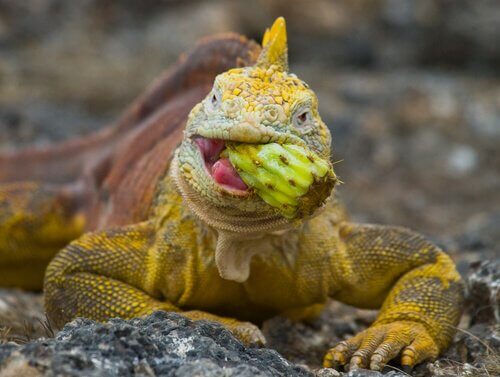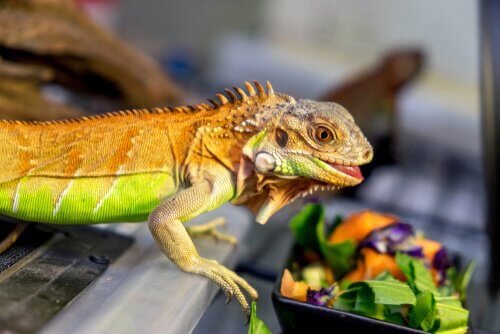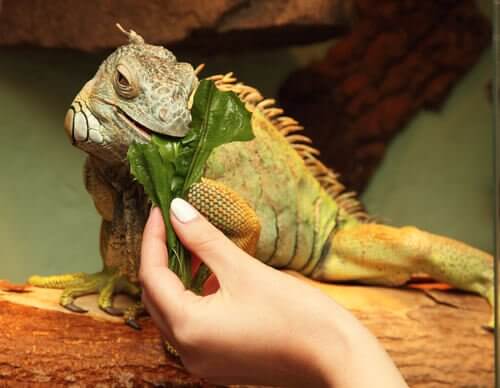Iguanas Lack Calcium and Vitamins

Having a pet requires a lot of responsibility and specific care. And, in the case of exotic species, we have to pay even more attention to their special requirements. In this article, we’ll tell you all about how iguanas lack calcium and vitamins, and what to do about it.
Lack of vitamins and calcium in iguanas
Since iguanas have only recently become ‘pets,’ we still need to learn a lot about them. One of the main problems that these reptiles have is they lack certain nutrients due to an unbalanced diet.
Veterinarians are amazed by the fact that a large part of the population has a disease by the name of osteodystrophy or metabolic bone disease. This cause of this disease is a lack of calcium in the body.
This problem tends to show up after the iguana’s first few months in their new home, especially if they’re still young. Their bones undergo a progressive decalcification and this causes a deformity in the jaw (it’s shorter than the upper part of the jaw) and in the extremities (giving them a robust appearance).
Another symptom of osteodystrophy is an increased risk of fractures in the front and hind legs, lameness, lumps in the extremities and even paralysis. When the latter happens, the iguana has constipation and their abdomen will bulge because he can’t properly eliminate gas and feces.
Many different factors can cause this disease. For example, little contact with sunlight and ultraviolet rays that activate vitamin D. This vitamin helps the animal absorb calcium from the intestine. This also happens when the iguana stays under the fluorescent light in their terrarium for several hours.

Another reason that iguanas lack calcium is their diet. They consume a lot of phosphorus which ‘competes’ with calcium. For that reason, they cannot absorb calcium correctly.
Unfortunately, many iguanas don’t have an adequate diet and they live in conditions that are far from ideal. This doesn’t mean the owners do it on purpose, but sometimes ignorance is very dangerous.
How to make sure your iguana is getting the calcium and vitamins it needs
First, it’s very important that you talk to your vet. He or she will tell you the best diet for your pet, regardless of what species he is.
If you’ve recently adopted an iguana, then you should definitely make sure you’re well-informed about his specific needs. This doesn’t just include his food, but also how much sunlight he needs. Don’t forget that it’s a cold-blooded reptile that requires heat to raise its body temperature.
Some vets may suggest a calcium or vitamin supplement. In that case, you have to be sure to follow the prescription exactly. But that doesn’t mean you can just forget about giving your pet a varied and quality diet.

What to feed your iguana
Normally, young iguanas (up to two years old) require these vitamins twice a week while adults only need them once. You may have read that there are even aerosol vitamins for reptiles. These are applied to their skin, but they aren’t proven to be as effective. In addition to that, they can cause major health problems.
The best thing you can do if iguanas lack calcium or vitamins is to give them a balanced diet that meets their needs. Keep in mind that these recently domesticated animals are herbivores. That means that they don’t eat insects or animals of any kind.
Its diet is made up of 70% vegetables, 15% fruits and the remaining 15% is for special ‘feed.’ This is only sold in veterinary clinics and pet stores.
Lastly, we recommend feeding him vegetables that are high in vitamins and calcium. For example, lettuce, beets, chard, cabbage and parsley. You can also give him cucumber, tomato, zucchini, and pepper, but to a lesser extent. Fruits that are suitable for iguanas are strawberries, bananas, apples, pears, and melon.
All cited sources were thoroughly reviewed by our team to ensure their quality, reliability, currency, and validity. The bibliography of this article was considered reliable and of academic or scientific accuracy.
Martínez, M., Arcos, J., Veléz, L., Mendoza, G y López, R. (2015). La iguana verde (Iguana iguana ) y sus parásitos en una unidad de manejo intensivo en la costa de Oaxaca. Temas de Ciencia y Tecnología.